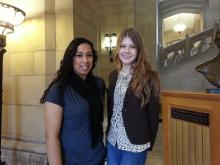This past autumn quarter, two seniors, both double majoring in Law, Societies, and Justice and Political Science, were interns at immigrant organizations. Akvile “Willa” Bukauskaite was at OneAmerica working with the Washington New Americans program, while Yuridia “Yuri” Equihua worked for a law office downtown that specializes in immigration issues.
Both students already had some experience with immigrant cultures. Bukauskaite is herself an immigrant from Lithuania, and has been in the United States since fourth grade.
“Being an immigrant myself and having my parents go through the citizenship process, I was like, ‘Oh, I know about this,’” she said. “It hit close to home. It was really fun to be part of it and learn more.”
OneAmerica was established following Sept. 11, 2001. According to the organizations’ website, it arose “in response to the hate crimes and discrimination targeting Arabs, Muslims and South Asians.”
The organization offers a variety of different opportunities for interns to participate in, including community organizing, policy advocacy and research, communications and media, and development. Running off the slogan “Justice for all,” OneAmerica aims to enhance community integration and civic engagement.
As an intern, Bukauskaite participated actively in OneAmerica’s Citizenship Day event, which was held in October.
“We go to about four different cities and get the word out to the community that there are going to be citizenship services,” she said. “We bring lawyers that work pro bono to give legal advice.”
The event is a big help to the immigrant community, especially for those with low income. Simply applying to be a citizen costs $680 – and there is no refund if you fill out the form incorrectly. But with Citizenship Day, immigrants get legal assistance to assure that they have done everything properly.
“They feel confident and excited instead of fearful,” Bukauskaite said of the immigrants that she got to help at the event. “It does a good job of switching the stigma [of becoming a citizen].”
Yuridia Equihua worked in a similar vein, but was able to use her language skills as well. In addition to her LSJ and Political Science majors, Equihua is also a Spanish minor.
One of the most rewarding aspects of her experience she said, was “being able to use my bilingual skills, and also when I could deliver any sort of good news.”
Good news is a light in a tunnel for the immigrants who Equihua assisted. She worked with an attorney, beginning her job by calling clients and getting more details about their situations.
“After the Deferred Actions for Child Arrivals passed, we started pushing for a lot of those to go through really fast,” Equihua said. “For all the clients that had potentially qualified children, we sent out letters letting them know. We followed up with phone calls to let them know that they qualified, if that was what they wanted to do.”
For those that did, Equihua and those she worked with collected evidence to build the cases for the children, usually between the ages of 15 and 21 years old. This information included when the students graduated and how long they had been in the United States. They collected copies of student identification cards and updated transcripts. Equihua was also tasked with translating letters to be sent out to some of the immigrant families.
Both students were able to find their internships through their networking and determination. Bukauskaite first heard of OneAmerica after reading a report by them in a class. After attending a symposium with them, she applied and was persistent and engaged, which eventually led to her snagging the position. Equihua was able to find her internship through a “networking night” in the Latino Student Union, an RSO at the university.
“You’re dealing with real people’s lives,” Equihua said of working with immigrants. “It’s a completely different experience. I have mixed feelings about it. It comes with so much sadness; sometimes the answers just aren’t available.”
But it’s not all sadness. Equihua also noted that when the news was good, it was always a joy to be able to be the messenger. It’s one of the reasons Bukauskaite enjoyed participating in Citizenship Day the most.
“Even though they’re undocumented, they’re still part of our society,” Bukauskaite said. “I’m glad that the language is moving from illegal to undocumented citizens. I feel like organizations like [OneAmerica] are doing a good job at helping communities use the better language and move toward change, finally.”
This article was composed by Kristine Kim.
